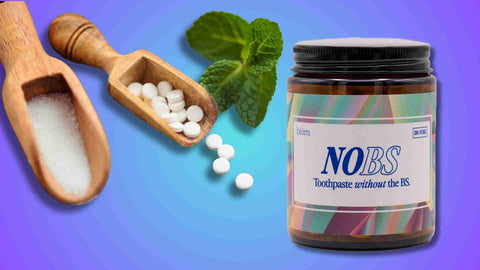So, Is Toothpaste Vegan?
While not all toothpastes are vegan, there are a few vegan options out there that are not only good for your oral health but good for the planet too.
Determining whether toothpaste is vegan involves examining ingredients such as propolis, flavorings, and food colorings, as well as the practices of their parent companies.
For example, vegan toothpaste like NOBS Toothpaste Tablets doesn’t include any animal derived ingredients.
Further, in addition to being vegan friendly, some toothpastes like NOBS are also cruelty free, meaning, the brand doesn’t do any animal testing.
So, if you’re considering aligning your oral care routine with your vegan lifestyle, there are definitely options to explore that cater to both your values and your dental needs.
Keep reading to learn more about the importance of choosing vegan toothpaste and how it can benefit not only your oral health but also the planet.
What is vegan toothpaste?

Vegan toothpaste is a type of toothpaste that is made without any animal-derived ingredients or by-products.
Unlike traditional toothpaste, which may contain ingredients such as glycerin derived from animal fats or abrasive agents like calcium phosphate sourced from animal bones, vegan toothpaste is formulated using plant-based alternatives.
These alternatives can include ingredients like vegetable glycerin, silica derived from sand, and natural flavors and sweeteners.
Vegan toothpaste is not only cruelty-free but also environmentally friendly, as it avoids the use of animal products and reduces the carbon footprint associated with animal agriculture.
Additionally, vegan toothpaste often comes in eco-friendly packaging, further aligning with the principles of sustainability.
Overall, choosing vegan toothpaste allows you to maintain good oral hygiene while adhering to your ethical values and supporting eco-conscious practices. Moreover, it aligns with the choice of natural toothpaste, highlighting the absence of artificial flavors, preservatives, colors, and sweeteners.
Does vegan toothpaste work?
Yes, vegan toothpaste works! It can effectively clean your teeth and gums, remove plaque, and freshen your breath, just like non-vegan toothpaste.
The absence of animal-derived ingredients in vegan toothpaste doesn't compromise its ability to maintain oral hygiene.
In fact, many vegan toothpaste options contain natural ingredients like nano hydroxyapatite that are gentle yet effective in promoting dental health.
So, whether you're following a vegan lifestyle or simply looking for a more eco-friendly oral care option, vegan toothpaste is a reliable choice for maintaining your healthy smile.
What toothpastes are vegan?

When it comes to vegan toothpaste options, NOBS Toothpaste Tablets stand out as an excellent choice.
These toothpaste tablets are not only vegan but also cruelty-free, containing 13 natural ingredients, including nano hydroxyapatite, xylitol, sodium bicarbonate, and organic coconut oil.
Each of these ingredients is carefully selected for its effectiveness in maintaining oral health without compromising your ethical values.
Additionally, NOBS offers a sustainable and convenient alternative to traditional toothpaste, as it come in tablet form that you simply chew and brush with water.
With their vegan and cruelty-free formulation, these fluoride-free vegan toothpaste tablets and vegan kids’ toothpaste are not only good for your oral care but also good for the planet.
Does vegan toothpaste remineralize teeth?
Yes, vegan toothpaste remineralizes teeth thanks to ingredients like nano hydroxyapatite.
Remineralization is a crucial process for strengthening tooth enamel and reversing early signs of tooth decay.
Vegan toothpaste often contains ingredients such as nano hydroxyapatite, which contribute on how remineralization works, which is by replenishing lost minerals and fortifying tooth enamel.
These ingredients work together to create a protective barrier against acids and bacteria, helping to prevent further demineralization and tooth decay.
Therefore, choosing a vegan toothpaste formulated with remineralizing agents can support overall dental health and promote strong, healthy teeth.
Does Vegan Toothpaste Whiten Teeth?

Yes, vegan toothpaste can whiten teeth effectively.
Many vegan toothpaste brands offer whitening formulas that contain ingredients such as silica or baking soda, which help remove surface stains and discoloration from teeth.
These ingredients work by gently polishing the enamel and breaking down stains, revealing a brighter and whiter smile over time.
Additionally, some vegan toothpaste may contain natural whitening agents such as papain (derived from papaya) or pineapple extract, which have enzymatic properties that help break down stains and brighten teeth.
Benefits of Using Vegan Toothpastes

Vegan toothpastes offer a range of benefits beyond conventional options, particularly when formulated with nano-hydroxyapatite. Here's what you need to know.
Remineralization and Enamel Strengthening
Vegan toothpastes containing nano-hydroxyapatite can effectively remineralize and strengthen tooth enamel.
This is achieved through the deposition of calcium and phosphate ions, which are naturally occurring minerals found in tooth enamel. This remineralization process helps to fill in microscopic defects and reduce tooth sensitivity.
Fluoride-Free Alternative
This nano-hydroxyapatite vegan toothpaste offers a fluoride-free alternative for maintaining optimal oral health. This is particularly beneficial for individuals who have fluoride sensitivities or allergies. The natural antibacterial properties of hydroxyapatite contribute to a healthier oral environment, reducing the risk of gum disease, tooth decay and other oral infections.
Gentle Cleaning and Plaque Control
Vegan toothpastes can provide gentle cleaning without being abrasive to the enamel. This gentle cleaning action effectively removes surface stains and plaque, which can contribute to tooth sensitivity.
By maintaining a clean and plaque-free tooth surface, nano-hydroxyapatite in this vegan toothpaste can help reduce sensitivity and improve overall oral health.
Tooth Sensitivity Relief
The nano-hydroxyapatite in vegan toothpaste can provide relief from tooth sensitivity.
This is achieved through the formation of a protective layer over the tooth structure, which acts as a barrier against acid challenges. This protective layer helps to reduce the permeability of the tooth and minimize sensitivity.
Additionally, incorporating aloe vera into vegan toothpaste can enhance oral health due to its antiseptic action, effectively cleaning hard-to-reach gum pockets and offering soothing benefits for tender and sensitive gums.
Natural and Non-Toxic
Vegan toothpastes are natural and non-toxic, making them a safer choice for those concerned about the ingredients in their oral care products.
Side Effects of Vegan Toothpastes

While vegan toothpaste is generally safe for most people, some individuals may experience certain side effects, depending on their specific dental needs and sensitivities.
Here are some potential side effects of using vegan toothpaste:
Allergic Reactions
Although vegan toothpastes are formulated without common allergens like dairy or animal products, some individuals may still be allergic to certain plant-based ingredients or essential oils used in vegan formulations. Always check the ingredients list and perform a patch test if you have known allergies.
Taste and Texture
Vegan toothpastes may have different tastes and textures compared to traditional toothpaste due to the absence of artificial flavors or sweeteners. Some people may find vegan toothpaste less appealing in terms of taste or texture.
Whitening Effects
While many vegan toothpastes offer whitening benefits, individuals with sensitive teeth or gums may experience discomfort or irritation from whitening ingredients such as hydrogen peroxide or activated charcoal. It's essential to use whitening toothpaste cautiously and discontinue use if irritation occurs.
Overall, while vegan toothpaste is a suitable option for many individuals seeking cruelty-free and environmentally friendly oral care products, it's essential to consider potential side effects and choose a toothpaste that meets your specific dental needs and preferences.
If you experience persistent discomfort or adverse reactions, consult your dentist for personalized recommendations.
How to Identify Vegan Toothpaste

To identify vegan toothpaste, start by checking the packaging for seals or labels that explicitly state “vegan” or “cruelty-free.” If you’re unsure, read the ingredient list for any animal-derived products or by-products. Some toothpaste brands may contain animal ingredients like propolis and glycerin, which are not immediately obvious as non-vegan.
Common non-vegan ingredients include glycerin derived from animal fats, bee-derived products like propolis, and boar bristles in toothbrushes.
If you’re still unsure, contact the manufacturer directly for detailed information. Additionally, look for certification logos from organizations like the Vegan Society, which ensures the product meets strict guidelines for vegan production and testing.
Finally, research the brand’s commitment to veganism and animal welfare to ensure their products align with your values.
To make it easy to identify vegan toothpaste, consider using NOBS Toothpaste Tablets. These convenient tablets are not only vegan but also environmentally friendly, as they come in plastic-free packaging.
Is vegan toothpaste as effective as fluoride toothpaste?

Studies suggest that vegan toothpaste is equally effective as non-vegan toothpaste but not superior to fluoride toothpaste.
However, when vegan toothpaste contains nano hydroxyapatite (nHA), it exhibits the same efficacy as fluoride toothpaste. Moreover, nano hydroxyapatite is safe and does not exhibit the negative effects associated with excess fluoride consumption, such as toxicity and fluorosis.
Therefore, opting for vegan toothpaste with nano hydroxyapatite can provide effective oral care while addressing concerns about ingredient safety and ethical considerations.
For those specifically looking for cavity prevention, there are vegan toothpaste options available that combine the benefits of nHA with vegan-friendly ingredients.
Should I switch to vegan toothpaste?

Yes, switching to a vegan toothpaste can be a great choice you.
Vegan toothpaste typically avoids animal-derived ingredients and is often formulated with natural, plant-based alternatives.
This can align with ethical beliefs regarding animal welfare and sustainability. Additionally, vegan toothpaste formulations often prioritize ingredients that are gentle on both teeth and gums, making them suitable for a wide range of individuals, including those with sensitive mouths or allergies to animal products.
Ultimately, opting for a vegan toothpaste can offer peace of mind knowing that you're using a product that aligns with your values while still effectively supporting your oral health.
Ingredients to Avoid in Toothpaste
When it comes to oral hygiene, toothpaste is a staple product for maintaining healthy teeth and gums. However, not all toothpaste formulations are created equal, and some may contain ingredients that pose potential risks to oral and overall health.
Let's explore several risky ingredients that may commonly be found in your toothpaste and discuss why you might want to avoid them.
Sodium Fluoride
Fluoride is known for its dental benefits, but concerns about potential adverse effects have led some to seek fluoride-free alternatives. Fluoride-sensitive individuals or those at risk of dental fluorosis may opt for fluoride-free toothpaste, particularly for young children prone to swallowing toothpaste.
This nano hydroxyapatite toothpaste are better than fluoride as it offers a safe and effective alternative, mimicking natural tooth composition and aiding in remineralization without fluoride.
Charcoal
Charcoal toothpaste's abrasive nature can harm tooth enamel over time, leading to increased sensitivity and susceptibility to damage. While charcoal effectively absorbs stains, its harshness may outweigh benefits, especially for those with sensitive teeth or weakened enamel.
Considering its potential long-term effects, individuals may want to limit or avoid regular use of charcoal toothpaste.
Triclosan
Triclosan's antimicrobial properties in toothpaste raise concerns about antibiotic resistance and hormonal disruption. Despite its use in oral care products, the ADA acknowledges insufficient evidence for its long-term safety and effectiveness.
Given these uncertainties, individuals may choose triclosan-free toothpaste to minimize potential risks to oral and overall health.
Hydrogen Peroxide
Hydrogen peroxide in toothpaste can whiten teeth but may cause oral irritation and sensitivity with prolonged use. Its harshness on gums and oral tissues can lead to inflammation and discomfort, especially for those with sensitive gums.
To avoid potential oral health issues, individuals may opt for toothpaste without hydrogen peroxide, particularly if prone to sensitivity or allergic reactions.
Sodium Lauryl Sulfate (SLS)
SLS, a common foaming agent in toothpaste, can strip away protective saliva and cause dryness or irritation in the mouth. Individuals with sensitive gums or a history of oral sensitivity may experience discomfort or allergic reactions to SLS.
Choosing SLS-free toothpaste formulations can help maintain oral health without exacerbating existing issues or concerns about long-term effects.
So, while toothpaste is generally safe, by and large, these ingredients are controversial for their potential to induce toxicity or irritation to the sensitive tissues in your mouth.
Thankfully, we have other safe ingredients that can replace this list, including nano hydroxyapatite which is a safe and effective alternative to fluoride.
Frequently Asked Questions
Which toothpastes are not vegan?
Toothpastes that are not vegan typically contain ingredients derived from animals or tested on animals. Common non-vegan ingredients found in toothpaste include glycerin (often sourced from animal fats), calcium phosphate (derived from animal bones), and certain types of fluoride. Additionally, toothpaste brands that conduct animal testing or use animal-derived glycerin may not be considered vegan. It's important to carefully read the ingredients list and look for vegan certifications to ensure that the toothpaste you choose aligns with your ethical values.
Is toothpaste suitable for vegans?
Yes, toothpaste can be suitable for vegans. Vegan toothpaste, such as NOBS toothpaste tablets, is formulated without any animal-derived ingredients or by-products, making it suitable for individuals following a vegan lifestyle. These toothpaste options are cruelty-free and do not contain ingredients sourced from animals, ensuring that vegans can maintain their oral hygiene while aligning with their ethical values.
How is toothpaste not vegan?
Toothpaste may not be vegan if it contains ingredients derived from animals or if it has been tested on animals. Common non-vegan ingredients found in toothpaste include glycerin (which can be sourced from animal fats), calcium phosphate (derived from animal bones), and certain types of fluoride. Additionally, some toothpaste brands may conduct animal testing during the development or manufacturing process, which can also make the product non-vegan. It's important for vegans to carefully check the ingredients list and look for cruelty-free and vegan certifications to ensure that the toothpaste they choose aligns with their ethical values.
Is nano hydroxyapatite are vegan?
Nano hydroxyapatite is a synthetic compound that mimics the natural hydroxyapatite found in tooth enamel. It is typically considered to be vegan because it is produced in a laboratory and does not contain any animal-derived ingredients. Additionally, nano hydroxyapatite is commonly used in vegan toothpaste formulations as an alternative to fluoride for remineralizing teeth and strengthening enamel. Therefore, toothpaste containing nano hydroxyapatite can be suitable for vegans.
Is fluoride vegan?
Fluoride is generally considered to be vegan, as it is a mineral that occurs naturally in the earth's crust and is not derived from animal sources. However, some fluoride sources used in toothpaste may not be vegan-friendly, depending on their manufacturing process. For example, some fluoride sources may be processed using animal-derived ingredients or may involve animal testing during production. Therefore, while fluoride itself is not inherently non-vegan, vegans may want to choose toothpaste brands that use cruelty-free and ethically sourced fluoride in their formulations.






















